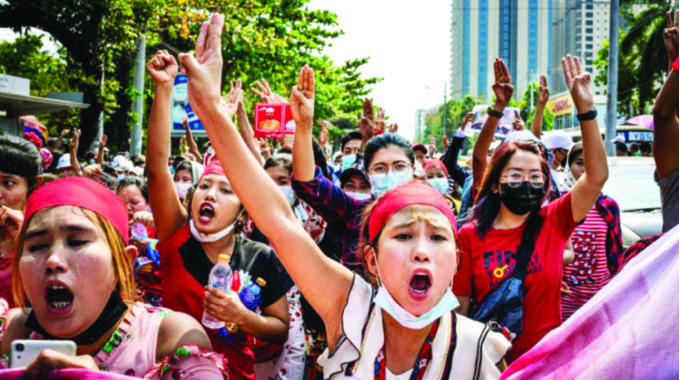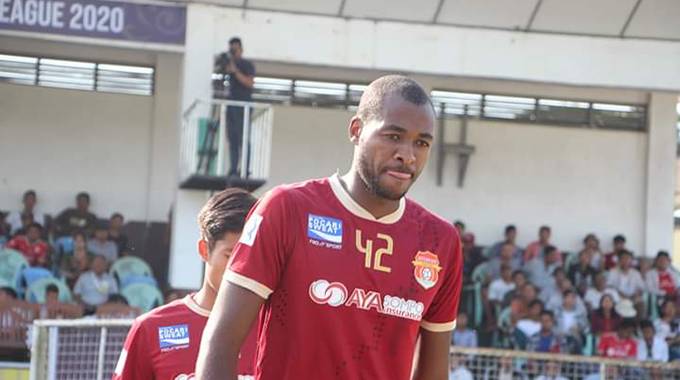Global wave of protests exposes West’s hypocrisy

Nobeman Runyanga
Correspondent
Over the past few months the world has witnessed a number of anti-government protests. Some of the countries where protests have occurred include Chad, China, Myanmar, Tunisia and Uganda, even the United States, which presents itself as the self-imposed global policeman, was not spared.
An analysis of these events shows that most of them have the ugly hand of the West in its quest to impose pliable leaders in resource-rich countries, who would enable the West to access them without resistance.
Western powers use the principles of democracy and human rights to support protests. Western countries such as the US use a lot of money to bankroll its regime change mission using local willing tools such as civil society organisations (CSOs), opposition political parties and individual activists.
This is particularly prevalent in African countries. Apart from the issues of resources, Western countries also use protests to assert their political power against other global powers especially in the East.
These are just driven by the need to massage their jingoistic political egos and to keep other powers in check.
The case of the assassination of the Democratic Republic of Congo’s (DRC) first Prime Minister, the late Patrice Lumumba on January 17, 1961 by the CIA amply illustrates how the West works in countries, which are rich in resources, in pursuit of its own interests.
Lumumba’s crime? His radical views threatened the interests of Belgium, the Western companies extracting the Congo’s mineral resources and the leaders of white ruled southern African states at the time.
Fifty years later, the West was at it again.
This time around it supported the Arab Spring protests of North Africa, which saw the leaders of Tunisia, Libya and Egypt namely Zine El Abidine Ben Ali, the late Muammar Gaddafi and the late Hosni Mubarak, being deposed.
While the reasons for the protests were given as economic hardships and general repression, the real reason why the West targeted the countries by supporting the protests is that they are home to oil.
Egypt is the largest non-OPEC oil producer in Africa and the third-largest dry natural gas producer on the continent.
The country also serves as a major transit route for oil shipped from the Persian Gulf to Europe and to the United States.
Tunisia oil and gas market contributes to the region’s oil production that stands at 5 percent of the global production.
Libya is another major source of oil in the region. The West uses people’s grievances as a cause to achieve their objectives.
A major slogan of the demonstrators during the protests was, “Ash-sha’b yurid isqat an-nizam,” which means “The people want to bring down the regime”.
At the time, the European Union (EU) Foreign Policy Chief, Catherine Ashton, and Commissioner, Stefan Fuele, jointly expressed their “support and recognition to the Tunisian people and their democratic aspirations”.
Ashton further stated that “the European Union is committed to supporting Tunisia economically and to supporting civil society in order to have free elections”.
The EU, therefore supported the undemocratic removal of Zine El Abidine Ben Ali using protests to usher in its own choice through elections.
Given that the West wishes the world to regard it as a paragon of democracy, this exposed its hypocrisy.
In Chad on February 6 , 2021, following the nomination of that country’s President, Idriss Deby, by his party to run for a sixth term, there were protests led by opposition and human rights activists.
In the West’s protest warfare in Africa, human rights and democracy activists are a euphemism for Western countries’ local paid foot soldiers.
Chad is the tenth-largest oil reserve holder among African countries. It has 1.5 billion barrels of proven reserves as of 2018 and reduced over 140 000 barrels per day in 2020.
Uganda has oil and is currently talking with the French oil company, Total and Chinese entity, CNOOC for investments to exploit it.
This is the reason why its January 2021 general elections attracted Western attention. This brought to the fore how Western countries indulge their meddlesome foreign policy to secure control of resources in some developing countries.
During the campaign season, opposition presidential candidate, Robert Kyagulanyi Ssentamu (also known as Bobi Wine) used the social media to mobilise his supporters for protests against what he termed irregularities ahead of the poll during a coronavirus lockdown.
When the incumbent President, Yoweri Museveni tried to use some Facebook accounts to campaign, the American social media company slammed them shut in an obviously biased support for Ssentamu.
The US supported protest during the COVID-19 pandemic in the hope of giving Sentamu an upper hand in an election in which odds were against him.
Recently the US has been using protests to fight in the corner of individuals or groups of people that oppose its main Eastern adversaries, China and Russia.
When Russian opposition figure and critic, Alexey Navalny was jailed in January 2021, over a fraud case, his supporters protested and some of them were arrested. The EU and the US swiftly called for the release of Navalny and his supporters despite the fact that the former had been convicted.
Political watchers highlighted that the US’ support for Navalny was the Western country’s way of revenging for Russia’s alleged interference in the US’ 2016 presidential elections and alleged poisoning of Russian dissidents in British soil.
This was despite the fact that former US President, Donald Trump did not treat with kid gloves #BlackLivesMatter protesters following the killing of a black American, George Floyd on 25 May 2020. Back in 2018, France, an EU member, was heavy handedness in dealing with Yellow Vest protestors.
The US readily asks other countries to release arrested protestors and activists but it demonstrated to the world that it does not tolerate lawlessness by arresting and prosecuting the Republican insurrectionists who invaded the Capitol Building on 6 Januarythis year.
It exports lawlessness to targeted countries for its political and economic benefit.
Last week, the US said that it was “deeply disturbed” by a BBC report accusing China of systematic rape and sexual torture of ethnic Uighur and other Muslim women detained in China’s Xinjiang camps. The UK said that it was under pressure to impose sanctions on China over the matter, which Beijing denied.
The US said that the matter should be met with “serious consequences”. However, the world knows that the US has a grimmer track record when it comes to the treatment of detainees.
The fake rape story was calculated by the West to cast a negative show on the Beijing 2022 Winter Olympics ahead of the event.
Apart from using protests to assert its power over other countries, the US routinely violates Article 41(1) of the Vienna Convention on Diplomatic Relations, which provides that, “without prejudice to their privileges and immunities, all persons enjoying privileges and immunities have a duty not to interfere in the internal affairs of (the receiving) State”.
In Myanmar, the military took power and detained the Prime Minister, Aung San Suu Kyi, citing electoral fraud during elections held in November 2020.
This sparked protests in Yangon with crowds demanding Suu Kyi’s release. The US took sides with the protestors and influenced thousands of hospital personnel across the country to don red ribbons and join the protests. Red is the colour of Kyi’s political party, the National League for Democracy (NLD). This was meant to reflect negatively on the military as this would affect health services delivery against a background of the Covid-19 pandemic.
Even in Zimbabwe, the US, the UK and the EU among others are always at the forefront of fighting on the side of the opposition, CSOs and individual activists while dealing heavy handedly with their own troublemakers back home.
Names that readily come to mind in this regard include journalist, Hopewell Chin’ono, MDC Alliance Deputy Chairperson, Job Sikhala as well as MDC Alliance activists, Cecilia Chimbiri, Joana Mamombe and Netsai Marowa.
The fact that their support for the activists is tied to their own countries’ foreign objectives exposes their hypocrisy as it shows them for who they are — hypocrites.
It also proves that their local running dogs are mere tools in a larger scheme of things that most of them do not even know a single thing about.









Comments